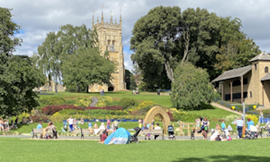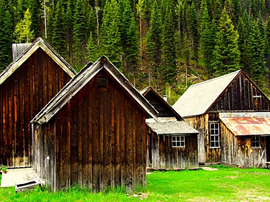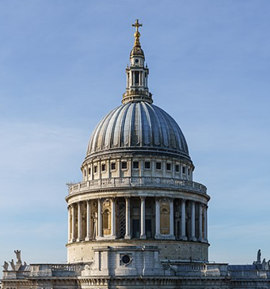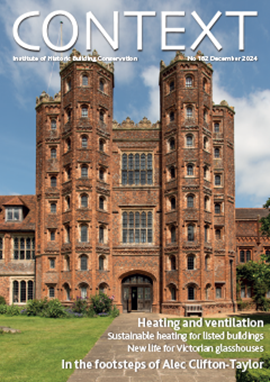Saint Michael's Kirkyard, Dumfries: a Presbyterian Valhalla
Saint Michael's Kirkyard, Dumfries: a Presbyterian Valhalla, James Stevens Curl, NERFL Press, Holywood, 2021, 228 pages, black and white and colour illustrations.
This handsome book, which was published by subscription (to buy it, contact [email protected] for further details), follows a series of Stevens Curl’s recent works that are listed on the first page. He has developed a specialism in the scholarly analysis and presentation of buildings and monuments, such as the graveyard in Dumfries and others in Scotland that are the subject of this, his most recent volume. It covers the period in the 1800s when it was customary for those who could afford it to erect a costly and grand funeral monument to family members.
Saint Michael’s is the site of a tomb so famous that it is a widely visited shrine. It once had, as shown in one of the many photos here, a top-hatted gatekeeper. ‘The greatest of Scots’, Robert Burns (1759–96), is buried here. His monument, like Pushkin’s in a Russian monastery garden, celebrates a writer who created a language by setting down a rural vernacular alongside literary forms, just as Dante had done for Italian (his tomb in Ravenna is cited and shown in these pages).
My career as a conservation officer touched on similar monuments in and around London, such as two Victorian cemeteries in Ealing and Thomas Grey’s beautiful, evocative monument at Stoke Poges. Current practitioners or recruits might do well to keep a copy of this book in readiness as a permanent reminder of the depth of knowledge needed for the full understanding of such memorials. The extent of source material that the long career of Stevens Curl has put at his command and his painstaking, thorough exposition of it set a standard which we should all endeavour to reach.
Exposed to the damp and breezy Dumfriesshire climate, the memorials are subject to decay, and the author raises questions of preservation and maintenance. The book might inspire conservators to look at this kirkyard and others like it for examples of decay and suitable remedies. Ownership of the book will instruct newcomers to the field of architectural history on most methods of research and how our strongest interests derive by instinct from real-life experiences, even in youth.
The author allows us glimpses of his personal and family history. We learn of how the time was spent, many years ago, when waiting at Dumfries to reach the Stranraer ferry on the way to his parents’ home in Ireland in this very kirkyard between the bluest of skies and driving rain.
This article originally appeared as: ‘Here lies Robert Burns’ in Context 168, published by the Institute of Historic Building Conservation (IHBC) in June 2021. It was written by Graham Tite, gardener, cook and essayist.
--Institute of Historic Building Conservation
Related articles on Designing Buildings Wiki
IHBC NewsBlog
SAVE celebrates 50 years of campaigning 1975-2025
SAVE Britain’s Heritage has announced events across the country to celebrate bringing new life to remarkable buildings.
IHBC Annual School 2025 - Shrewsbury 12-14 June
Themed Heritage in Context – Value: Plan: Change, join in-person or online.
200th Anniversary Celebration of the Modern Railway Planned
The Stockton & Darlington Railway opened on September 27, 1825.
Competence Framework Launched for Sustainability in the Built Environment
The Construction Industry Council (CIC) and the Edge have jointly published the framework.
Historic England Launches Wellbeing Strategy for Heritage
Whether through visiting, volunteering, learning or creative practice, engaging with heritage can strengthen confidence, resilience, hope and social connections.
National Trust for Canada’s Review of 2024
Great Saves & Worst Losses Highlighted
IHBC's SelfStarter Website Undergoes Refresh
New updates and resources for emerging conservation professionals.
‘Behind the Scenes’ podcast on St. Pauls Cathedral Published
Experience the inside track on one of the world’s best known places of worship and visitor attractions.
National Audit Office (NAO) says Government building maintenance backlog is at least £49 billion
The public spending watchdog will need to consider the best way to manage its assets to bring property condition to a satisfactory level.
IHBC Publishes C182 focused on Heating and Ventilation
The latest issue of Context explores sustainable heating for listed buildings and more.

















